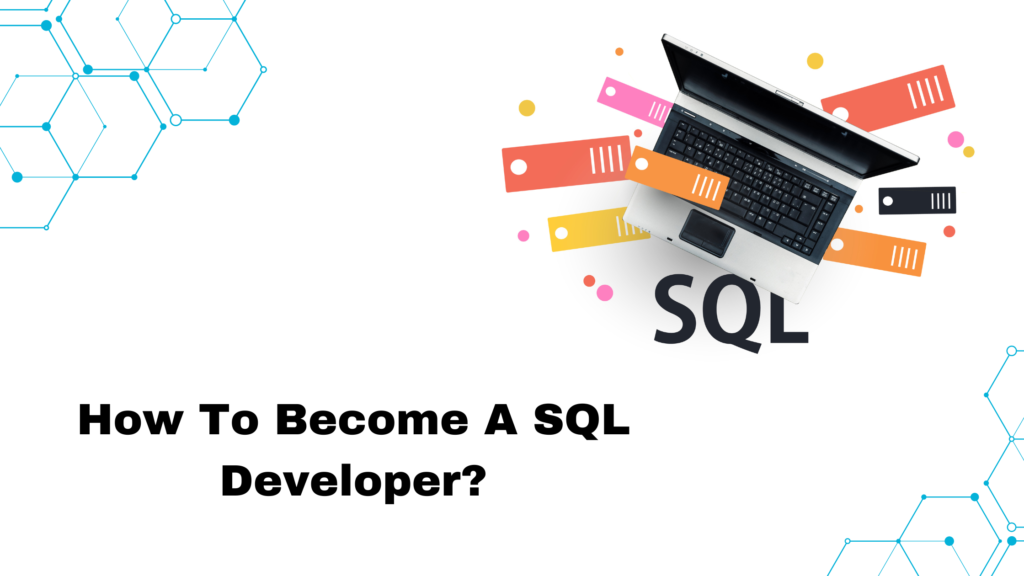How to become a SQL Developer?

Structured Query Language (SQL) is a powerful tool for managing and analyzing data. Whether you’re a beginner or have some programming experience, learning SQL can open doors to various career opportunities in data management and analysis. In this blog post, we will provide a step-by-step guide to help you learn SQL from scratch, covering the essential concepts and providing resources to solidify your understanding along the way.
What is SQL?
Structured Query Language (SQL) is a fundamental skill in the field of data management and analysis. SQL developers play a crucial role in designing and optimizing databases, writing complex queries, and ensuring efficient data retrieval.
How to Become An SQL Developer?
Step 1: Understand the Basics:
Familiarize yourself with SQL fundamentals, including databases, tables, relationships, and key concepts like primary keys and indexes.
Step 2: Set Up Your Learning Environment:
Install a relational database management system (DBMS) like MySQL or PostgreSQL on your computer to practice SQL.
Step 3: Learn SQL Syntax:
Master SQL syntax, starting with basic statements like SELECT, INSERT, UPDATE, and DELETE. Practice filtering, sorting, and using aggregate functions.
Step 4: Understand Data Manipulation:
Study advanced SQL concepts, including data manipulation functions, subqueries, and different types of joins.
Step 5: Dive into Database Design:
Gain a solid understanding of database design principles, normalization, and entity-relationship modeling. Practice designing tables and establishing relationships.
Step 6: Explore Advanced SQL Concepts:
Delve into topics like stored procedures, views, indexing, transactions, and the ACID principles.
Step 7: Practice and Apply Your Skills:
Create sample databases and work on projects simulating real-world scenarios. Participate in coding platforms and communities to solve challenges.
Step 8: Utilize Learning Resources:
Leverage online tutorials, courses, videos, and textbooks to reinforce your understanding. Platforms like SQLZoo, Codecademy, and W3Schools are helpful.
Step 9: Engage in Practical Projects:
Apply your SQL skills to internships, volunteer work, or freelance projects to gain practical experience and build your portfolio.
Step 10: Continuous Learning and Professional Development:
Stay updated with the latest SQL trends, best practices, and advancements. Engage with the SQL community and consider pursuing certifications for professional growth.
Skills Required to Become an SQL Developer:
- Proficiency in SQL: A deep understanding of SQL syntax, including querying, filtering, sorting, and manipulating data.
- Database Design: Knowledge of database design principles, normalization, entity-relationship modeling, and establishing relationships between tables.
- Data Manipulation: Ability to work with advanced SQL concepts like subqueries, joins, aggregate functions, and stored procedures.
- Query Optimization: Familiarity with techniques for optimizing SQL queries, including indexing, performance tuning, and understanding execution plans.
- Relational Database Management Systems (RDBMS): Experience working with popular RDBMS platforms like MySQL, PostgreSQL, SQL Server, or Oracle.
- Data Analysis and Reporting: Ability to extract meaningful insights from data using SQL and present them in a clear and understandable manner.
- Problem-Solving Skills: Strong analytical and problem-solving skills to tackle complex database-related challenges and optimize database performance.
- Attention to Detail: A meticulous approach to writing SQL queries, ensuring accuracy and avoiding errors.
- Collaboration and Communication: Effective communication skills to work collaboratively with teams, understand requirements, and translate them into SQL solutions.
- Continuous Learning: An eagerness to stay updated with the latest advancements in SQL, database technologies, and industry trends.
Conclusion:
Becoming an SQL developer requires a combination of theoretical knowledge, practical experience, and continuous learning. By mastering SQL syntax, understanding database design principles, gaining hands-on experience, and staying updated with the latest trends, you can establish yourself as a skilled SQL developer. Embrace the diverse opportunities in the data management field, and with dedication and perseverance, you can embark on a fulfilling career as an SQL developer.

Leave a Reply